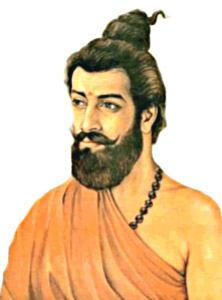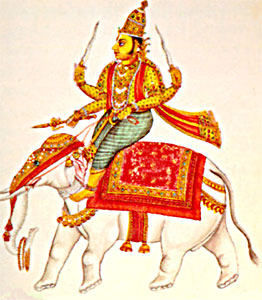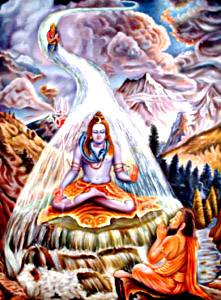In the Vishnu Purana, Sagara is the son of Bahu or Bahuka. There is mythical story regarding the birth of Sagara. Bahu was vanquished by the tribes of Haihayas and Talajanghas. In consequence of which Bahu fled into the forests with his wives. One of his wives was pregnant, and being an object of jealousy to a rival queen, the latter gave poison to destroy her delivery. The poison had the effect of confining the child in the womb for seven years. Bahu, being old, died in the neighborhood of the residence of the Muni Aurva.
Bahu`s queen constructed his pile, ascended it with the determination of accompanying him in death. The sage Aurva knew events of past, present and the future. He said to the wife of Bahu that what she was doing was unrighteous. Bahu was a valiant prince, the monarch of many realms, the offer of many sacrifices, the destroyer of his foes. His descendant is in the womb of his other wife. Accordingly, in obedience to his injunctions, the cunning wife relinquished her intention. The sage then conducted her to his abode, and after some time a very splendid boy was there born, named Sagara. Along with him the poison that had been given to his mother was expelled and Aurva, after performing the ceremonies required at birth, gave him on that account the name of Sagara. Sagara is derived from the words `Sa` and `Gara`, Sa means `with,` and Gara means `poison.` The same holy sage celebrated his joy with the cord of his class, instructed Sagara fully in the Vedas, and taught him the use of arms, especially those of fire, called after Bhargava.
When the boy Sagara grew up, and was capable of reflection, he asked his mother why they are dwelling in this hermitage and where is his father and who he is. His mother narrated him the whole incident what had happened. Upon hearing this Sagara was highly incensed, and vowed to recover his patrimonial Kingdom and exterminate the Haihayas and Talajanghas. Accordingly when Sagara became a grown up man he put nearly the whole of the Haihayas to death, and would have also destroyed the Sakas, the Yavanas, Kambojas, Paradas, and Pahanavas. These tribes applied to Vasishtha, the family priest of Sagara, for protection. Vasishtha spoke to Sagara and suggested him to stop killing innocent people. Sagara, in compliance with the injunctions of his spiritual guide, contented himself. He left the tribes with imposing upon the vanquished nation`s peculiar distinguishing marks.
Sagara made the Yavanas shave their heads entirely. To the Sakas, he compelled to shave half of their heads. The Paradas wore their hair long and the Pahnavas let their beards grow, in obedience to his commands. With the other Kshatriya races he made them deprive of the established usages of oblations to fire and the study of the Vedas. The deprived Kshatriyas later became Mlechhas. Sagara, after the recovery of his kingdom, reigned over the seven-zoned earth with undisputed dominion.
 Sagara had two wives, Sumati the daughter of Kashyapa, and Kesini the daughter of Raja Viderbha. Being without progeny, the king Sagara begged the aid of the sage Aurva with great earnestness. The Muni pronounced this boon that one wife should bear one son, the upholder of his race, and the other should give birth to sixty thousand sons. Sagara left the choice to his two wives. Kesini chose to have the single son and Sumati to have sixty thousand sons.
Sagara had two wives, Sumati the daughter of Kashyapa, and Kesini the daughter of Raja Viderbha. Being without progeny, the king Sagara begged the aid of the sage Aurva with great earnestness. The Muni pronounced this boon that one wife should bear one son, the upholder of his race, and the other should give birth to sixty thousand sons. Sagara left the choice to his two wives. Kesini chose to have the single son and Sumati to have sixty thousand sons.
Kesini after a short time bore Asamanjas, a prince through whom the dynasty continued and Sumati gave birth to sixty thousand sons. The son of Asamanjas was Anshuman.
Asamanjas was from his childhood was wild and wicked. His father Sagara hoped that as he grew up to manhood he would reform. But finding that he continued guilty of the same immorality, Sagara abandoned him. The sixty thousand other sons of Sagara was also very wicked. The path of virtue and piety being obstructed in the world by the sons of Sagara, the gods repaired to the Muni Kapila, who was a portion of Lord Vishnu, free from fault, and endowed with all true wisdom. Kapila Muni said that after some time the son of Sagara will be destroyed.
 At that period King Sagara commenced the performance of the solemn sacrifice of a horse, or Ashvamedha Yajna to prove his supremacy. Lord Indra as usual became terrified over the results of the Yajna. He decided to steal the horse of Sagara. Indra magically left the horse at the ashram of Kapila Muni, where he was meditating. King Sagara`s sixty thousand sons and his son Asamanja were then sent to find the horse. When Sagara`s sons found the horse at Kapila Muni`s hermitage or ashram, they thought he had stolen it. The sons of Sagara were getting ready to attack Kapila when suddenly Kapila opened his eyes and saw them. As the sons of King Sagara had insulted him, accordingly, they were immediately destroyed for creating sin. Fire emanated from the bodies of Sagara`s son and they were immediately burned to ashes.
At that period King Sagara commenced the performance of the solemn sacrifice of a horse, or Ashvamedha Yajna to prove his supremacy. Lord Indra as usual became terrified over the results of the Yajna. He decided to steal the horse of Sagara. Indra magically left the horse at the ashram of Kapila Muni, where he was meditating. King Sagara`s sixty thousand sons and his son Asamanja were then sent to find the horse. When Sagara`s sons found the horse at Kapila Muni`s hermitage or ashram, they thought he had stolen it. The sons of Sagara were getting ready to attack Kapila when suddenly Kapila opened his eyes and saw them. As the sons of King Sagara had insulted him, accordingly, they were immediately destroyed for creating sin. Fire emanated from the bodies of Sagara`s son and they were immediately burned to ashes.
When Sagara learned this he sent his grandson Anshuman to get back the horse. Kapila Muni returned the horse and told Anshuman that the sons of King Sagara were dead and ordered Anshuman to ask a boon.
Anshuman requested as a boon that his uncles and his father, who had perished though the sage`s displeasure, might although unworthy of it, he raised to heaven through his favour. Kapila blessed him and Anshuman bring down upon earth the Ganges of the gods. Ganges pours down her holy waters in the ashes of the sons of Sagara. Sagara, on recovering the steed, completed his sacrifice; and in affectionate memory of his sons, denominated Sagara the chasm which they had dug.
 King Sagar`s great-great-grandson, Bhagiratha, eventually pleased Mother Ganga, and asked her to come to earth. Devi Ganga said to Bhagiratha that the force of the Ganges falling from heaven would be too great for the earth to sustain, and that she needed a god to break the fall. Bhagiratha then worshiped Lord Shiva, who then agreed to accept the descending river upon his head.
King Sagar`s great-great-grandson, Bhagiratha, eventually pleased Mother Ganga, and asked her to come to earth. Devi Ganga said to Bhagiratha that the force of the Ganges falling from heaven would be too great for the earth to sustain, and that she needed a god to break the fall. Bhagiratha then worshiped Lord Shiva, who then agreed to accept the descending river upon his head.
King Bhagiratha then leaded the holy river with his chariot and ripped open a gap in which the Ganga could flow. The river followed through where Kapila Muni resided. The Devi Ganga then bathed the remains of the sixty thousand sons and freed their souls to heaven.
Sagara is till the name of the ocean, and especially of the Bay of Bengal, at the mouth of the Ganges.



















